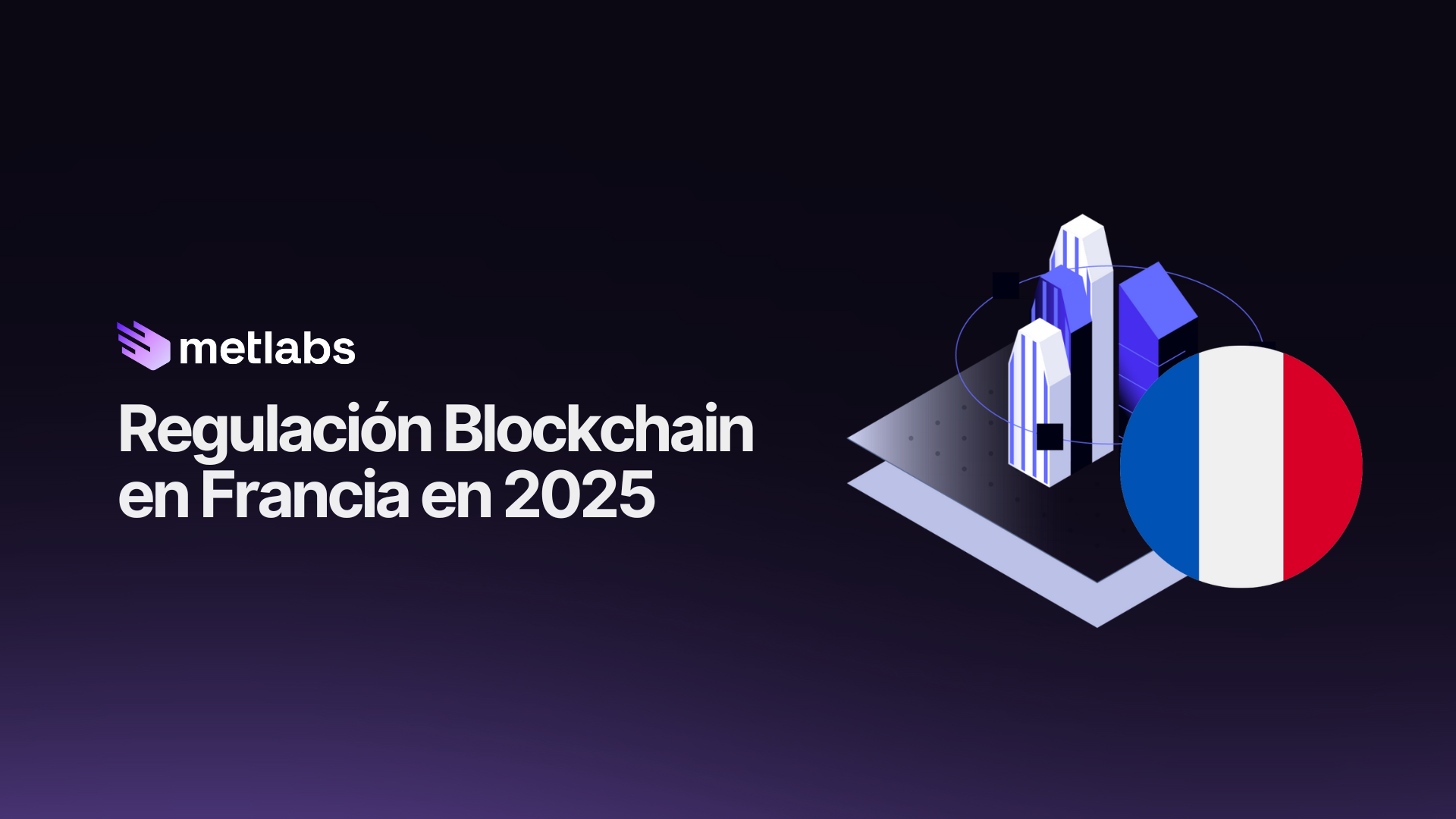The adoption of blockchain technology and asset tokenization is advancing at a rapid pace, but the real engine driving its global development is the existence of a clear, consistent and innovation-friendly legal framework.
Some countries have already established themselves as regulatory benchmarks, establishing specific rules for cryptoassets, DLT infrastructures and the issuance of legally backed tokens. In this article we show you the relevant information about blockchain regulation in France, which you can use as a guide if you are looking to operate internationally or evaluate different strategic locations.

Current legislation on blockchain and virtual assets in France
MiCA Regulation (Markets in Crypto-Assets Regulation)
Establishes the EU’s first comprehensive legal framework for regulating cryptoasset issuers and service providers (CASPs). Covers stablecoins, utility tokens, electronic money tokens (EMTs), asset referenced tokens (ARTs), and custody or exchange platforms. Requires prior authorization, governance requirements, solvency, transparency, and user protection.
MiFID II (Markets in Financial Instruments Directive II)
MiFID II is a European directive applicable in France to cryptoassets considered as financial instruments, such as security tokens. It requires AMF licensing, capital requirements, governance rules and transparency. It regulates investor protection, order execution and financial advice. Compliance is mandatory to legally operate with this type of assets in the French market.
PACTE Act (Plan d’Action pour la Croissance et la Transformation des Entreprises)
The 2019 PACTE Law made France a pioneer in crypto regulation by establishing a legal framework for ICOs and digital asset service providers (PSANs). It introduced a voluntary visa for ICOs, legally defined what a digital asset is and required mandatory registration of crypto companies with the AMF, with security, solvency and regulatory compliance requirements. Its balanced approach between control and fostering innovation positioned France as a European benchmark in cryptoasset regulation.
Ordinance No. 2017-1674
It authorized the registration of certain financial securities (e.g., unlisted bonds, minibonds) in a decentralized electronic registration device (DEEP, commonly blockchain), recognizing such registration as legal proof of ownership and as a valid mechanism for transferring securities. In practice, this means that it is possible to issue and transfer transfer transferable securities in France without paper and traditional intermediation of a central depositary, using blockchain with the same legal certainty.
Cryptoassets Sandbox and DLT Pilot Regime France
France does not have a dedicated national sandbox for blockchain, but actively participates in the European sandbox for testing crypto innovations in a controlled environment. The AMF has proposed to create its own sandbox focused on security tokens, still in the evaluation phase. This initiative aims to boost regulated innovation in digital assets and reinforce French leadership in blockchain technologies.
Tokenization makes it possible to digitally represent real-world assets via blockchain, but for it to have legal value, a regulatory framework recognizing this operation is essential. France adopts its own approach, establishing specific rules for the issuance, custody or trading of tokens. In this block we explain how asset tokenization is regulated from a legal point of view, taking an advanced jurisdiction such as France as an example.
Regulation of asset tokenization in France
France is positioned as one of the most advanced European countries in regulating asset tokenization. Since 2017, it has allowed securities such as unlisted bonds and minibonds to be registered in blockchain technologies with full legal validity, thanks to a pioneering ordinance. This has facilitated the issuance of tokenized financial instruments by companies such as Societe Generale and TOBAM, as well as the creation of regulated stablecoins such as the EUR CoinVertible, designed to comply with MiCA and applicable regulations, and which regulatory status is supervised by the French authorities.
In addition, the country actively participates in the EU DLT Pilot Regime (Regulation 2022/858), which specifically targets financial instruments considered tradable securities, and allows blockchain platforms to operate under test conditions, with direct supervision and certain regulatory exemptions. Euronext Paris and several local fintechs are already experimenting with this framework to explore secondary markets for tokens representing stocks or bonds. Beyond the financial sector, France also welcomes the tokenization of real estate assets, digital art and sovereign digital identity projects, with initiatives aligned with general regulations on intellectual property, consumer protection and institutional support.
Regulatory bodies and authorities for digital assets in France
Autorité des Marchés Financiers (AMF)
The AMF is the regulator of the securities market in France and oversees digital assets. Since 2019, it manages the mandatory registration of PSANs for crypto services such as custody, trading or exchange. It can also grant voluntary visa to ICOs. With MiCA, it will be the authority in charge of authorizing and supervising CASPs. It publishes guidelines, blacklists and collaborates with international bodies such as ESMA and IOSCO.
Autorité de Contrôle Prudentiel et de Résolution (ACPR)
The ACPR, under the Bank of France, supervises banks and insurance companies and monitors compliance with anti-money laundering regulations. In the crypto sector, it collaborates with the AMF by assessing AML/CFT aspects of PSANs. He is also key in the supervision of EMT-type stablecoins. He has led wholesale digital euro experiments on blockchain. Although acting behind the scenes, it ensures the stability and solvency of the financial system.
Banque de France
It is actively involved in the development of the digital euro, collaborating with the ECB and other European institutions on CBDC tests and studies. It monitors the stability of the French financial system and assesses the potential impacts of digital currencies and tokenization. It does not directly regulate cryptoassets, but its role is key in implementing monetary policies and coordinating regulatory initiatives and technological experiments.
Launching a business based on digital assets requires more than just technology: it is also necessary to comply with legal requirements such as licensing, registration and regulatory obligations. These conditions ensure that the business model is viable and sustainable over time, and that it complies with transparency and fraud prevention standards. In this section we explore what licenses are typically required and what compliance criteria blockchain companies operating in France must follow.

What licenses and requirements are needed to trade cryptoassets in France?
CASP License (MiCA)
MiCA’s CASP license will progressively replace the PSAN license granted by the AMF. All companies will have to obtain the new CASP authorization to continue to operate legally in France and in the EU. It includes custody, trading, exchange, platform management, token issuance, advisory and other services related to cryptoassets.
Investment Company License
If a French platform offers crypto derivatives (such as futures, options, CFDs or other financial products whose underlying is a cryptocurrency), those products are considered financial instruments under European and French law. Therefore, the trader needs an investment firm license under MiFID II to be able to offer them legally.
AML/KYC Compliance
In France, compliance with AML/KYC requirements is mandatory for any company offering services with cryptoassets. This implies that they must identify and verify the identity of their clients, monitor transactions and report any suspicious activity, following money laundering and terrorist financing prevention rules.
Other regulatory requirements
It is also mandatory to implement cybersecurity measures and business continuity plans, in line with the Digital Operational Resilience Regulation (DORA), which establishes a binding and comprehensive framework for managing information and communication technology (ICT) risks in the EU financial sector. Compliance with DORA is mandatory to maintain the MiCA license.
Are you exploring developing your blockchain project in France?
At Metlabs we help companies like yours and offer comprehensive support in the development of blockchain projects and tokenization of assets such as real estate, carbon credits, commodities, intellectual property, financial instruments, franchises and more, fully aligned with blockchain regulation in France and international regulatory standards.
Contact us and find out how we can help you meeting all your business model needs, from technical validation and structuring to design, development and implementation of custom blockchain solutions, ready to scale from day one.



